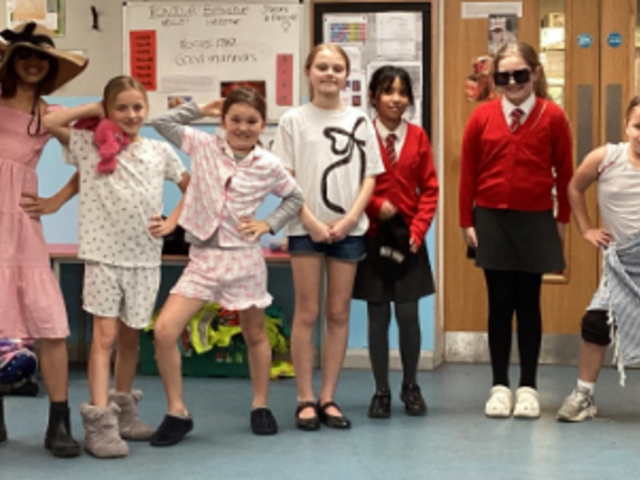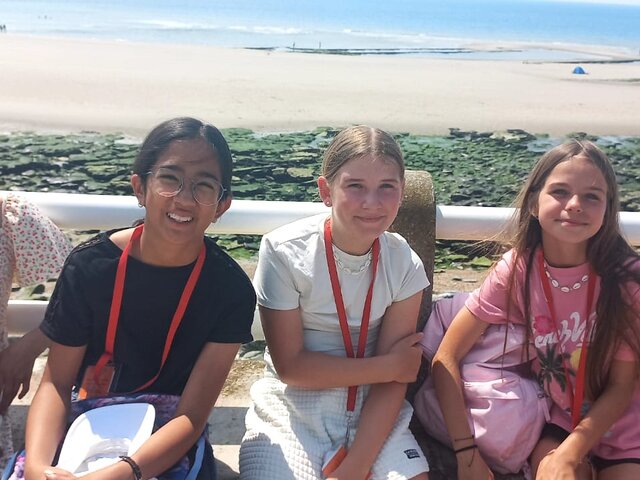Welcome to Modern Foreign Languages
French lessons have resumed to being taught in each classroom. Children at Wallace Fields Junior School learn French throughout the school in a 30 minute lesson taught by a qualified French Lead, Mrs Cornell. We have also been able to reintroduce extra-curricular clubs for French and Spanish across the school and hope to resume other languages going forward e.g. German and Latin.
Modern Foreign Language Progression Map
Modern Foreign Language - French at WFJS
Intent
We offer a carefully planned sequence of lessons, ensuring progressive coverage of the skills required by the national curriculum. Our chosen themes provide an introduction to the culture of French-speaking countries and communities. We aim to foster children’s curiosity and help deepen their understanding of the world. A progressive curriculum has been chosen to allow opportunity for children to gradually build on their skills. We enable children to express their ideas and thoughts in French and provide opportunities to interact and communicate with others both in speech and in writing.
In Lower KS2, children acquire basic skills and understanding of French with a strong emphasis placed on developing their Speaking and Listening skills. These will be embedded and further developed in Upper KS2, alongside Reading and Writing, gradually progressing onto more complex language concepts and greater learner autonomy.
Through our progression map, we intend to inspire pupils to develop a love of languages and to expand their horizons to other countries, cultures and people. We aim to help children grow into curious, confident and reflective language learners and to provide them with a foundation that will equip them for further language studies.
Implementation
Lessons are sequenced so that prior learning is considered and opportunities for revision of language and grammar are built in.
We help children to build on prior knowledge alongside the introduction of new skills. We provide structure and context as well as offering an insight into the culture of French-speaking countries and communities. The introduction and revision of key vocabulary and grammatical structures is built into each lesson. This vocabulary is then included in display materials and additional resources so that children have opportunities to repeat and revise their learning.
- Celebrating Languages Day- 30 September 2022- The entire day is dedicated to children learning about different countries including their language, culture, history, and art. We have native guest speakers, who are often the parents/carers of current pupils, who give presentations about their countries. Our Music teacher also engages the children in songs from the designated countries.
- Informational and cultural exchanges with a French school providing an opportunity to engage in pen pal correspondence and other exchanges such as specific French celebrations and holidays.
- French Friday at lunchtimes whereby children greet the lunch team in French and obtain house points whilst familiarizing themselves with French menus and food vocabulary.
- Cross-curricular-based French lessons correlating to the respective year group trips: ie Year 3: the Stone Age – Trip to Buster Farm, Year 4:The Vikings – trip to Hooke Court, Year 5: Settlements and Rivers -trip to Isle of Wight, Year 6: French Food Tasting – French Market Day.
- French homework, utilising day to day learning, is set and is then displayed in the school.
Impact
We use a full range of resources, including the following:
- Phonics work
- Physical objects such as dice, bingo cards, whiteboards, flashcards
- Linguascope- a fun, interactive language website, used both in class and at home
- French story books, songs, rhymes and poetry.
All of the above will increase the profile of languages across school. The learning environment will be consistent with key French vocabulary displayed, spoken and used by all learners. Whole-school and parental engagement will improve through the use of language-specific home learning tasks and opportunities suggested in lessons and overviews for wider learning. We want to ensure that French is loved by teachers and pupils across school, therefore encouraging them to embark on further language studies. Impact can also be measured through key questioning skills built into lessons, child-led assessment such as success criteria grids and summative assessments aimed at targeting next steps in learning.
Teaching Modern Foreign Languages to children with special needs
We teach Modern Foreign Languages (MFL) to all children, whatever their ability. MFL forms part of the school curriculum policy to provide a broad and balanced education for all children. We provide learning opportunities that are matched to the needs of children with learning difficulties and take into account any arrangements from their SEND support plans to allow children to learn key language skills.
Useful websites
- Further your French learning by practising on Linguascope, our fun interactive platform, free to all WFJS pupils (even in the summer!). Click on the link: https://www.linguascope.com/ The login username and password can be found in your child's Reading Record. The password is updated once a year.
- To help your child at home, you can visit the BBC schools’ website, which is free to use and needs no log-in details. This can be found at: https://www.bbc.co.uk/bitesize/subjects/z39d7ty.
National Curriculum
To find out more about the national curriculum for Languages in Key Stage 2 that the school is following click here.

